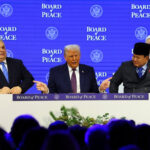Dar es Salaam, Tanzania — 20 September 2025 — Beaches in Dar es Salaam were transformed today as the Jahazi Project and partners, including the Environmental Conservation Community of Tanzania (ECCT), and Ben Pol Foundation, brought together students, youth groups, civil society, and local leaders to mark International Coastal Cleanup Day and World Cleanup Day. Volunteers collected waste along the shoreline of Silver Sand and Mbali beaches, raising awareness on the urgent need to address marine litter under the theme “Protecting Our Ocean, Protecting Our Heritage.”
The cleanup drew attention to the global crisis of marine pollution, with an estimated 11 million metric tons of plastic entering the ocean every year. In Tanzania, marine litter is choking coral reefs, threatening fisheries, and undermining tourism. The activity complements the government’s ongoing preparations for a National Marine Litter Action Plan, which is being developed to build a circular economy for plastics and protect coastal ecosystems. While the plan takes shape at the policy level, community-driven efforts like this event demonstrate practical action on the ground. By uniting citizens, organizations, and local stakeholders, the clean-up reinforces national priorities, shows readiness to support government direction, and highlights that safeguarding our oceans requires both policy leadership and public participation.
According to the Jahazi Project, the message resonated across the wider region. In East Africa and the Southwest Indian Ocean, countries are scaling up action against marine pollution, from Kenya’s plastic bans and marine litter plan to Mauritius’ circular economy roadmap, Mozambique’s coastal restoration projects, Comoros’ expansion of marine protected areas, Seychelles’ Blue Bond–backed conservation programs, and Madagascar’s community-driven waste management and reef restoration. Together, these initiatives reflect a growing recognition that marine litter is not only an environmental issue but also a social and economic challenge.
“Our ocean is our heritage and our future,” said Michael Mallya, spokesperson for the Jahazi Project. “What happened here in Dar es Salaam is part of a wider regional effort to protect our coastlines, empower communities, and safeguard the Blue Economy. Cleanup Day is proof that when governments, citizens, and young people act together, real change is possible.”
Speaking on behalf of the Environmental Conservation Community of Tanzania (ECCT), the Executive Director, Lucky Michael, emphasized the importance of collaboration: “Marine litter is not just an environmental problem, it is a community challenge. This cleanup shows how partnerships between government, civil society, international partners, and local communities can drive solutions that last.”
For the Ben Pol Foundation, the event highlighted the urgency of action. “Every plastic bottle collected today is one less threat to our reefs, fisheries, and future,” said Ben Pol, Founder. “But the real victory will come when we reduce waste at the source and support a circular economy that aligns with Tanzania’s national priorities and other countries in the region.”
Today’s cleanup builds on the Blue Voices Roundtable, where leaders from the region pledged to accelerate action on marine protection and combat illegal fishing. By linking grassroots mobilization with national policies and regional strategies under the regional agreements, such as the Nairobi Convention, the Jahazi Project is helping turn commitments into tangible impact.
For participants, however, the most powerful takeaway was that protecting the ocean cannot stop with one cleanup; it must become a sustained commitment to preserving the lifeline of coastal communities for generations to come.
About The Jahazi Project
The Jahazi Project, led by Ascending Africa, is a regional initiative dedicated to revitalizing East Africa’s Blue Economy while safeguarding the long-term sustainability of its marine resources. Drawing on the cultural symbolism of the dhow, the project unites heritage, environmental stewardship, and economic opportunity in pursuit of a thriving, resilient coastline. Central to this effort is the fight against illegal, unreported, and unregulated (IUU) fishing, which threatens the livelihoods of coastal communities and undermines sustainable development across the region.
About Ascending Africa
Ascending Africa is a Pan-African organization committed to fostering sustainable development across the continent, focusing on environmental preservation, community empowerment, and economic growth.
For More Information
Visit The Jahazi Project and Ascending Africa websites
to learn more about these initiatives.
Media Contact:
Name: Michael Mallya
Title: The Jahazi Project’s Spokesperson
Email: michael.mallya@jahaziproject.org
Phone Number: +255789147255






